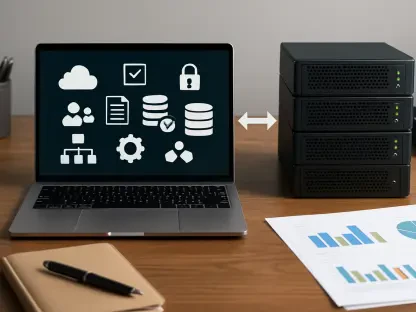IBM & Microsoft’s New Experience Zones Address Tech Skills Gap
The ever-evolving landscape of technology demands a workforce adept at navigating advanced tools like AI and cloud computing. However, there’s a growing disparity between what’s needed and the skills available in the market. IBM and Microsoft, two tech giants, have recognized this critical issue and are pooling their resources to bridge this gap. By launching Experience Zones in various global locations, they aim to provide hands-on opportunities for businesses and individuals alike. These centers are dedicated to fostering skill development and innovation, bringing practical tech solutions to diverse industries.
Addressing the Global Technology Skills Gap
In today’s fast-paced technological world, the demand for skilled tech workers far exceeds the available talent. Projections estimate a shortage of 85 million tech workers by 2030, potentially costing the global economy $8.5 trillion in lost annual revenues. This alarming gap necessitates a proactive approach to upskilling the workforce. IBM and Microsoft’s initiative is designed to equip people with the necessary skills to meet this challenge. By launching new Experience Zones, they aim to provide environments where technology can be explored and experimented with in a practical setting. These hubs are more than just learning centers; they are catalysts for innovation.
The global technology skills gap continues to widen, and the consequences of not addressing this issue could be severe for the economy. Recognizing the urgency, IBM and Microsoft have taken significant steps to create platforms that not only offer educational opportunities but also inspire innovation across different sectors. These Experience Zones are strategically placed in diverse locations to maximize their impact, ensuring a broader reach and addressing localized skill deficits. The initiative signifies a major step forward in democratizing access to cutting-edge technologies and preparing a future-ready workforce.
The Collaborative Efforts of IBM and Microsoft
This strategic partnership between IBM and Microsoft exemplifies the power of collaboration in addressing significant industry challenges. Their combined expertise and resources make them uniquely positioned to offer comprehensive solutions. The new Experience Zones in Romania, the USA, and the UK serve as physical representations of this collaborative effort. Each center is equipped with advanced tools and technologies like generative AI and hybrid cloud solutions. These zones are designed to offer hands-on learning experiences, allowing businesses to directly engage with new technologies and understand their practical applications. This tangible interaction is key to fostering deeper understanding and innovation.
By pooling their resources, these tech giants are not just addressing a skills gap but creating an ecosystem where learning and innovation go hand in hand. The Experience Zones act as interactive playfields where companies can utilize various tools that IBM and Microsoft offer, ensuring a cohesive and comprehensive approach to skills development. Both companies are investing heavily in these zones to demonstrate their technologies’ real-world applications. This hands-on involvement encourages businesses to think creatively about solving problems unique to their industries, thereby driving both technological and economic advancement.
Practical Hands-On Exploration
One of the standout features of these Experience Zones is the emphasis on practical, hands-on learning. The centers serve as interactive playgrounds where businesses can test and experiment with Microsoft and IBM technologies. This kind of exploration is crucial for understanding how these tools can be implemented to solve real-world problems. Participants can engage with technologies such as Microsoft Azure, Azure OpenAI Service, and Microsoft Copilot, among others. This hands-on approach not only demystifies advanced tech but also provides participants with the confidence and skills needed to integrate these solutions into their operations effectively.
Hands-on experience is invaluable for truly understanding the potential and limitations of new technologies. By engaging directly with the tools, businesses can make more informed decisions about their tech needs. This level of interaction offers businesses immediate insights into how they can leverage advanced technologies to solve complex challenges specific to their operations. Moreover, such practical exposure prepares the workforce for the demands of a modern workplace, ensuring that employees are not just theoretically proficient but also practically skilled to handle real-world tasks efficiently.
Impact on Various Industries
The versatility of the technologies available at the Experience Zones means a wide range of industries can benefit. For instance, in financial services, companies like JPMorgan Chase or Barclays can streamline their processes using AI tools. This can lead to more efficient loan application processing and better overall service delivery. Advanced AI algorithms can analyze vast amounts of data quickly, providing insights that would take humans far longer to derive. This enhances both the efficiency and accuracy of various financial services, from credit scoring to fraud detection, enabling these institutions to offer improved customer experiences.
In healthcare, organizations such as the National Health Service (NHS) in the UK can explore the use of cloud-based solutions like Microsoft Azure for secure, cross-clinic access to patient files. This not only enhances efficiency but also improves patient care by ensuring that critical information is accessible when needed. The implementation of cloud technologies can streamline various administrative processes, freeing up healthcare professionals to focus more on patient care. Additionally, such technologies facilitate better disaster recovery solutions, ensuring that patient data is not lost even in the event of system failures, thereby enhancing overall reliability and trust in healthcare services.
Leveraging IBM’s Consulting Expertise
IBM’s consulting expertise plays a crucial role in making this initiative successful. By combining this expertise with Microsoft’s cutting-edge technologies, the partnership offers tailored solutions to meet industry-specific needs. This collaboration ensures that the solutions provided are not just theoretically sound but practically implementable as well. IBM plans to bolster this effort by increasing the number of Microsoft and generative AI certifications held by its consultants. This move is aimed at meeting the rising client interest and demand for these technologies, ensuring that IBM can provide the highest level of expertise and support.
Incorporating IBM’s deep industry knowledge with Microsoft’s technological advancements allows the partnership to offer more nuanced and effective solutions. This tailored approach ensures that businesses receive the most relevant and impactful advice and support, enabling them to achieve their strategic goals. Moreover, the emphasis on certifications showcases IBM’s commitment to maintaining a high standard of competence within their consulting teams. By continuously updating their skills, IBM consultants can provide up-to-date and relevant advice, helping clients navigate the complexities of modern technology landscapes more efficiently.
Experience Zones as Catalysts for Innovation
The Experience Zones are more than just learning centers. They are catalysts for innovation, offering businesses the chance to experiment and come up with new ways to integrate AI and cloud solutions into their operations. This proactive approach is essential for staying competitive in today’s fast-moving tech landscape. Plans are underway to expand these zones to additional global Client Innovation Centers. This planned expansion underscores the long-term commitment of IBM and Microsoft to this strategic partnership, aiming to make advanced technology education accessible to a broader audience.
By providing a sandbox environment, the Experience Zones encourage businesses to push the boundaries of what is possible with current technology. This kind of innovation is crucial for staying competitive in today’s fast-changing tech landscape. The zones also facilitate cross-industry dialogues, enabling businesses to learn from each other’s experiences and challenges. This collaborative environment is fertile ground for groundbreaking ideas and solutions that can drive industry-wide change. The future expansions signal the companies’ long-term vision to democratize technology education and innovation on a global scale.
Enhancing Client Engagement
Client engagement is a critical component of the Experience Zones. Events such as hackathons are organized to promote the practical use and customization of AI-based solutions. These events allow businesses to engage deeply with the technology, fostering an environment of creativity and problem-solving. By involving clients in such interactive events, IBM and Microsoft are ensuring that the solutions developed are not just innovative, but also closely aligned with the actual needs and challenges of the industries they serve. This client-focused approach is crucial for making technology adoption smoother and more impactful.
Interactive events such as hackathons not only provide a platform for learning but also act as incubators for innovative solutions. Clients get to see firsthand how technologies can be customized to suit their unique needs, providing valuable insights that are directly applicable to their operations. This level of engagement fosters a sense of collaboration and investment from the clients, making them active participants in the innovation process. By bringing real-world challenges into the learning environments, IBM and Microsoft are ensuring that the solutions developed are both practical and effective.
Long-Term Vision and Global Impact
The rapidly changing tech landscape requires a workforce skilled in using advanced tools like AI and cloud computing. Unfortunately, a disparity exists between the necessary skills and those available in the job market. Recognizing this significant issue, tech giants IBM and Microsoft have decided to pool their resources to address this gap. Their strategy involves setting up Experience Zones in various locations around the world. These centers are designed to offer hands-on opportunities for both businesses and individuals, helping to cultivate skills and promote innovation. The goal is to provide practical tech solutions that can be applied across a wide range of industries, thereby ensuring that the workforce is better equipped to meet the demands of modern technology. By providing real-world experiences and training, these Experience Zones aim to nurture a new generation of tech-savvy professionals. This collaborative effort highlights the importance of continuous learning and adaptation in today’s fast-paced technological environment, ultimately benefiting both industries and the individuals working within them.









